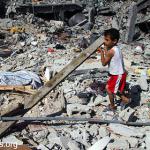Outlines of the Gaza Truce: Immediate Steps and Future Talks

Israel and the Palestinians agreed on Tuesday to an Egyptian-brokered plan to end the fighting in Gaza after 50 days of combat in which more than 2,100 Palestinians, most of them civilians, 64 Israeli soldiers and five civilians in Israel were killed.
Following are the broad parameters of the agreement, which Israeli and Palestinian negotiators have been working on through indirect talks in Cairo over recent weeks.
As part of the deal, both sides have agreed to address more complex issues dividing them - including the release of Palestinian prisoners and Gaza's demands for a sea port - via further indirect talks starting within a month.
IMMEDIATE STEPS
* Hamas and other militant groups in Gaza agree to halt all rocket and mortar fire into Israel.
* Israel will stop all military action including air strikes and ground operations.
* Israel agrees to open more of its border crossings with Gaza to allow the easier flow of goods, including humanitarian aid and reconstruction equipment, into the coastal enclave.
* In a separate, bilateral agreement, Egypt will agree to open its 14 km (8 mile) border with Gaza at Rafah.
* The Palestinian Authority, headed by President Mahmoud Abbas, is expected to take over responsibility for administering Gaza's borders from Hamas. Israel and Egypt hope it will ensure weapons, ammunition and any "dual-use" goods are prevented from flowing into Gaza.
* The Palestinian Authority will lead in coordinating the reconstruction effort in Gaza with international donors, including the European Union.
* Israel is expected to narrow the security buffer along the inside of the Gaza border, reducing it from 300 metres to 100 meters if the truce holds. The move will allow Palestinians more access to farm land close to the border.
* Israel will extend the fishing limit off Gaza's coast to six miles from three miles, with the possibility of widening it gradually if the truce holds. Ultimately, the Palestinians want to return to a full 12-mile international allowance.
LONGER TERM ISSUES TO BE DISCUSSED
* Hamas wants Israel to release hundreds of Palestinian prisoners rounded up in the West Bank following the abduction and killing of three Jewish seminary students in June, an attack that led to the war. Hamas initially denied involvement in the killings, but a senior Hamas official in exile in Turkey last week admitted the group did carry out the attack.
* President Abbas, who heads the Fatah party, wants freedom for long-serving Palestinian prisoners whose release was dropped after the collapse of peace talks between Israel and the Palestinian Authority.
* Israel wants Hamas and other militant groups in Gaza to hand over all body parts and personal effects of Israeli soldiers killed during the war.
* Hamas wants a sea port built in Gaza, allowing goods and people to be ferried in and out of the enclave. Israel has long rejected the plans, but it is possible that progress towards it could be made if there are absolute security guarantees.
* Hamas wants the un-freezing of funds to allow it to pay 40,000 police, government workers and other administrative staff who have largely been without salaries since late last year.
* The Palestinians also want the airport in Gaza - Yasser Arafat International, which opened in 1998 but was shut down in 2000 after it was bombed by Israel - to be rebuilt.
[Reporting by Nidal al-Mughrabi; writing by Luke Baker; editing by Larry King for Reuters]
